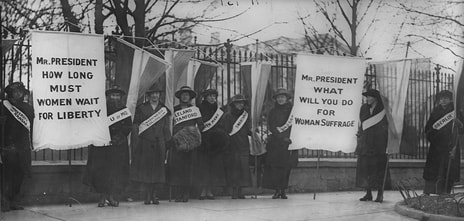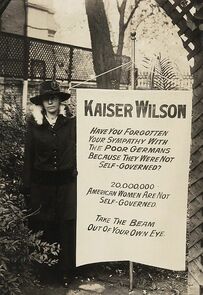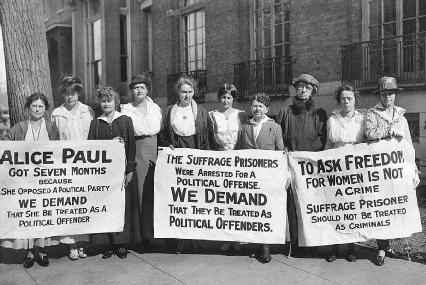For two and half years, beginning in January of 1917 and lasting until June 4, 1919 when the Nineteenth Amendment was passed by both the House of Representatives and the Senate, the women stood vigil outside the White House six days a week. They were at first met with some amusement, then as the protests continued, the response began to vary. Some supported them, others disapproved (such as Carrie Chapman Catt, leader of the National American Woman Suffrage Association), while others opposed them with words of insult or physical violence.
When the protesters remained undeterred in their commitment and began to gain publicity for their cause, something had to be done about them. They were arrested under charges of obstructing traffic, but the suffragettes refused to pay the fines and accepted jail time instead. As soon as they were released, they resumed their posts and were arrested again.
In July, sixteen women were arrested and sentenced to sixty days in jail or to pay a twenty-five dollar fine. Guess what these brave women chose? They were sent to the Occoquan Workhouse in Virginia where conditions were unsanitary and unsafe. President Wilson pardoned the women after they had served three days, but they refused to accept his pardon on the basis that they were innocent of committing a crime. They contended that they were not criminals but political prisoners. They were forced out, but later arrested again and returned to the workhouse.
The story was leaked to the newspapers and brought national attention to the suffragettes, their cause, and their dedication to it. Two weeks after their arrest, the women were released. The Circuit Court of Appeals vacated their convictions on the basis that the charges were overly vague.
In January of 1918, the day before the amendment was presented to Congress for a vote, President Wilson made a statement in support of the women's suffrage movement. Although the vote narrowly passed in the House of Representatives, the Senate refused to debate it until October, where it failed by two votes.
The protests continued and so did the arrests.




 RSS Feed
RSS Feed